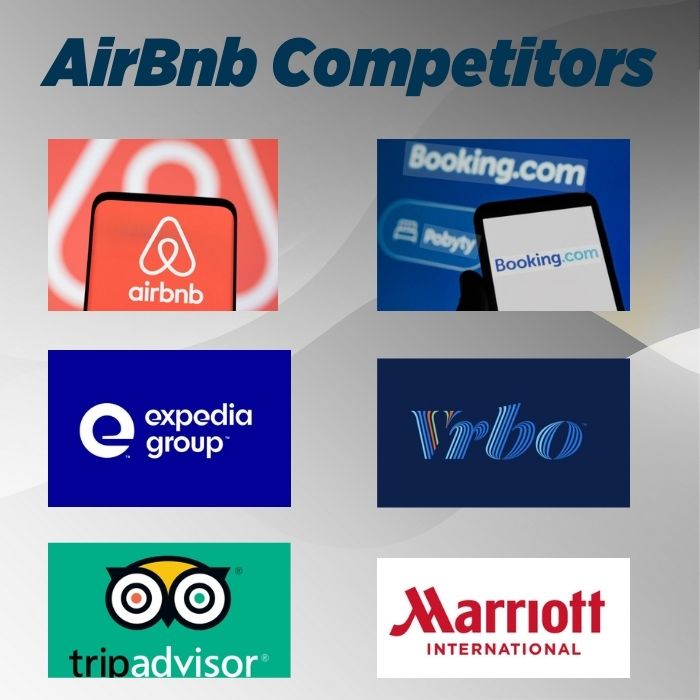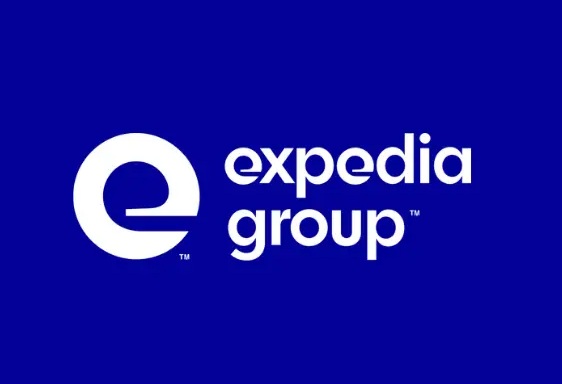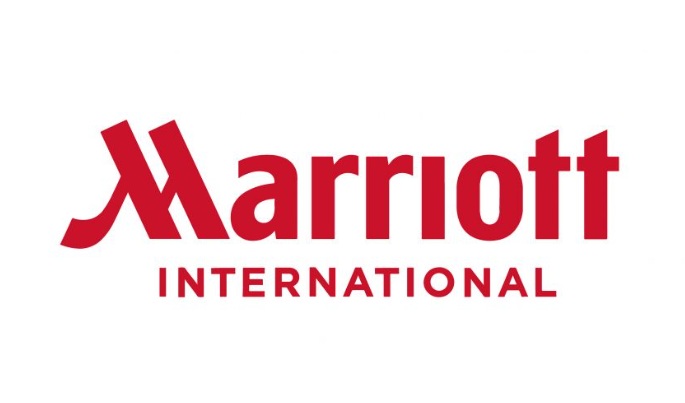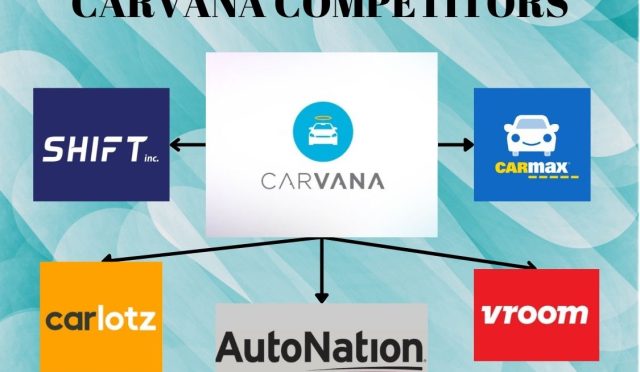Introduction
This analysis of Airbnb competitors explores the dynamic landscape of the travel and hospitality industry, where Airbnb, Inc. (ABNB) has disrupted traditional players and become a global leader in alternative accommodations and experiences. Airbnb’s competitors include a mix of established hotel chains, online travel agencies (OTAs), and specialized vacation rental platforms, all vying for a share of the growing market for unique and personalized travel experiences. Understanding the strengths and weaknesses of these Airbnb competitors is crucial for travelers seeking the best accommodations and for investors evaluating the competitive dynamics of this evolving market.
What is Airbnb? What does it do?
Airbnb has revolutionized the travel industry by offering a platform for individuals to rent out their homes, apartments, and unique spaces to travelers seeking authentic and personalized experiences. The company’s success has challenged traditional hotels and spurred the growth of the alternative accommodations market. However, the travel industry is constantly evolving, with new technologies, changing consumer preferences, and increasing competition shaping its future.
Key Airbnb Competitors
This analysis delves deeper into some of the most prominent Airbnb competitors:

Company Overview
| Feature | Airbnb | Vrbo | Booking.com | Expedia Group | Marriott International | Tripadvisor |
| Founded | 2008 | 1995 | 1996 | 1996 | 1927 | 2000 |
| Founder(s) | Brian Chesky, Joe Gebbia, Nathan Blecharczyk | David Clouse | Geert-Jan Bruinsma | Rich Barton | J. Willard Marriott & Alice Marriott | Stephen Kaufer, Langley Steinert, Nick Shanny, Thomas Palka |
| CEO | Brian Chesky | (part of Expedia Group) | Glenn Fogel | Peter Kern | Anthony Capuano | Matt Goldberg |
| Mission | To create a world where anyone can belong anywhere. | To make it easier for everyone to experience the world. | To make it easier for everyone to experience the world. | To bring the world within reach. | To be the world’s favorite travel company. | To help people around the world plan and have the perfect trip. |
| Employees | ~6,000 | (part of Expedia Group) | ~25,000 | ~25,000 | ~174,000 | ~3,000 |
| Headquarters | San Francisco, California, USA | (part of Expedia Group) | Amsterdam, Netherlands | Seattle, Washington, USA | Bethesda, Maryland, USA | Needham, Massachusetts, USA |
Market Share (Approximate) of the Airbnb Competitors
- Airbnb: ~20% (leading player in the alternative accommodations market)
- Vrbo: ~15% (strong competitor focusing on vacation rentals)
- Booking.com: ~10% (major OTA with a growing vacation rental segment)
- Expedia Group: ~8% (OTA with various brands, including Vrbo and Hotels.com)
- Marriott International: ~5% (largest hotel chain globally, with a growing vacation rental offering)
Product/Service Range of the Airbnb Alternatives
- Airbnb: Unique accommodations (homes, apartments, villas, etc.), experiences (tours, activities, etc.), long-term stays.
- Vrbo: Vacation rentals (homes, condos, cabins), primarily focused on whole-home rentals.
- Booking.com: Hotels, vacation rentals, flights, car rentals, and other travel services.
- Expedia Group: Hotels, vacation rentals, flights, car rentals, cruises, activities, and package deals through various brands.
- Marriott International: Hotels and resorts under various brands, vacation rentals (Homes & Villas by Marriott), loyalty program (Marriott Bonvoy).
- Tripadvisor: Hotel reviews, vacation rental listings, restaurant reviews, and other travel-related content.
Strengths and Weaknesses of the Airbnb Competitors
Airbnb:

- Strengths: Wide selection of unique accommodations, strong brand recognition, and a large community of hosts and guests.
- Weaknesses: Regulatory challenges in some cities, potential safety and security concerns, and increasing competition from other platforms.
Vrbo:

- Strengths: Focus on vacation rentals, user-friendly platform, and a strong loyalty program (One Key).
- Weaknesses: Smaller inventory compared to Airbnb, and less diverse offerings in terms of experiences and long-term stays.
Booking.com:

- Strengths: Large selection of accommodations, strong international presence, and a wide range of travel services.
- Weaknesses: Less focus on unique or alternative accommodations compared to Airbnb, and can be less personal.
Expedia Group:

- Strengths: Diverse portfolio of travel brands, comprehensive travel offerings, and a large customer base.
- Weaknesses: Can be complex to navigate its various brands and offerings, and customer service can be inconsistent.
Marriott International:

- Strengths: Strong brand reputation, extensive hotel network, and a loyal customer base through its Marriott Bonvoy program.
- Weaknesses: Limited inventory in the vacation rental market compared to Airbnb and Vrbo.
Tripadvisor:

- Strengths: Large user base, extensive travel reviews and content, and a growing presence in vacation rentals.
- Weaknesses: Primarily a metasearch engine and review platform, and does not handle bookings directly.
Investments and Future Plans of the Airbnb Competitors
- Airbnb: Expanding its experiences offerings, focusing on long-term stays, and investing in technology to improve the user experience.
- Vrbo: Growing its inventory of vacation rentals, enhancing its platform features, and expanding its loyalty program.
- Booking.com: Investing in its vacation rental segment, expanding its alternative accommodations offerings, and improving its mobile experience.
- Expedia Group: Integrating its various brands and platforms, investing in technology to personalize travel recommendations, and expanding its loyalty program.
- Marriott International: Growing its Homes & Villas by Marriott platform, expanding its luxury offerings, and leveraging its Marriott Bonvoy program to attract more guests.
- Tripadvisor: Expanding its vacation rental listings, enhancing its user reviews and recommendations, and exploring new features to improve the travel planning experience.
Head-to-Head Comparison of the Airbnb Alternatives
- Airbnb vs. Vrbo: Airbnb offers a wider variety of accommodations and experiences, while Vrbo focuses on whole-home vacation rentals and has a stronger loyalty program.
- Airbnb vs. Booking.com: Airbnb specializes in unique and alternative accommodations, while Booking.com offers a broader range of travel services, including hotels and flights.
- Airbnb vs. Marriott: Airbnb has a larger inventory of vacation rentals and a more diverse offering, while Marriott offers a strong brand reputation and a loyalty program that appeals to traditional hotel guests.
Consumer Experiences and Preferences of the Airbnb Competitors
- Authenticity: Many travelers prefer Airbnb for its unique and authentic accommodations and experiences, allowing them to connect with local cultures and communities.
- Price: Airbnb can offer competitive pricing, especially for larger groups or longer stays, but prices can vary significantly depending on the location and type of accommodation.
- Flexibility: Airbnb offers more flexibility in terms of check-in/check-out times, amenities, and house rules compared to traditional hotels.
- Space: Airbnb accommodations often provide more space and privacy than hotel rooms, which can be appealing for families or groups.
- Customer Service: Airbnb’s customer service has faced criticism in the past, but the company has been making efforts to improve its support and responsiveness.
Customer Satisfaction of the Airbnb Alternatives
- Airbnb: Customer satisfaction can vary depending on the individual experience, but Airbnb generally receives positive feedback for its unique accommodations and user-friendly platform.
- Vrbo: Known for its user-friendly interface and strong customer support, particularly for families and groups booking vacation rentals.
- Booking.com: Generally receives positive feedback for its wide selection of accommodations and its easy-to-use platform, but customer service can be inconsistent.
- Expedia Group: Customer satisfaction can vary depending on the specific brand and service, but the company has been working to improve its customer support and platform integration.
Conclusion
Airbnb is a major disruptor in the travel and hospitality industry, offering a unique platform for alternative accommodations and experiences. However, it faces competition from established players and emerging platforms, each with its own strengths and weaknesses. When choosing accommodations for their next trip, travelers should consider their individual needs, preferences, and budget, as well as the specific offerings and strengths of each platform. By understanding the competitive landscape and the evolving trends in travel, consumers can make informed decisions to find the perfect accommodations for their next adventure.
FAQ about Airbnb Competitors
Who are the main competitors of Airbnb?
The main competitors of Airbnb include:
- Vrbo: Focuses primarily on vacation rentals, particularly whole-home rentals.
- Booking.com: A major OTA offering a wide range of accommodations, including hotels and vacation rentals.
- Expedia Group: An OTA with various brands, including Vrbo and Hotels.com, offering comprehensive travel services.
- Marriott International: A leading hotel chain that has expanded into vacation rentals through its Homes & Villas by Marriott platform.
- Tripadvisor: Primarily a review and metasearch platform that also lists vacation rentals.
What are the strengths of Airbnb compared to its competitors?
Airbnb’s strengths include:
- A wide selection of unique accommodations, including homes, apartments, and unique spaces.
- Strong brand recognition and a large community of hosts and guests.
- The ability to offer personalized experiences, such as tours and activities.
- Flexibility in check-in/check-out times and amenities.
What are the weaknesses of Airbnb?
Airbnb faces several weaknesses:
- Regulatory challenges in various cities that may limit operations.
- Potential safety and security concerns for guests.
- Increasing competition from established hotel chains and other vacation rental platforms.
- Customer service issues that have been criticized in the past.
How does Vrbo differ from Airbnb?
Vrbo primarily focuses on whole-home vacation rentals, making it ideal for families or groups seeking larger accommodations. In contrast, Airbnb offers a broader range of unique accommodations, including shared spaces and experiences, appealing to travelers looking for authenticity.
Is Booking.com a direct competitor to Airbnb?
Yes, Booking.com is a direct competitor as it offers a wide array of accommodations, including hotels and vacation rentals. However, it tends to focus less on unique or alternative accommodations compared to Airbnb.
What is the market share of Airbnb compared to its competitors?
As of recent estimates, Airbnb holds approximately 20% of the alternative accommodations market, while its competitors have the following market shares:
- Vrbo: ~15%
- Booking.com: ~10%
- Expedia Group: ~8%
- Marriott International: ~5%
How do customer satisfaction levels compare among Airbnb and its competitors?
Customer satisfaction can vary widely among platforms:
- Airbnb generally receives positive feedback for its unique offerings but has faced criticism for customer service.
- Vrbo is known for its user-friendly interface and strong support, especially for families.
- Booking.com is praised for its selection but has inconsistent customer service.
- Expedia Group has been working to improve satisfaction across its various brands.
What are the future plans for Airbnb and its competitors?
- Airbnb is focusing on expanding its experiences offerings and improving technology for better user experiences.
- Vrbo aims to grow its inventory and enhance platform features.
- Booking.com is investing in its vacation rental segment and improving mobile experiences.
- Expedia Group plans to integrate its brands and personalize travel recommendations.
- Marriott International is growing its vacation rental offerings and leveraging its loyalty program.
- Tripadvisor seeks to enhance user reviews and expand vacation rental listings.
How can travelers choose between Airbnb and its competitors?
Travelers should consider their individual needs, preferences, and budget. Factors to evaluate include:
- Type of accommodation desired (unique spaces vs. traditional hotels).
- The importance of customer service and support.
- Specific amenities and flexibility in booking.
- Loyalty programs and potential discounts.
Are there safety concerns with using Airbnb compared to traditional hotels?
While both Airbnb and traditional hotels have safety protocols, Airbnb has faced scrutiny regarding the safety of individual properties and hosts. Travelers should read reviews, check ratings, and communicate with hosts to ensure a safe experience. Traditional hotels often have standardized safety measures in place, which may provide additional peace of mind.

